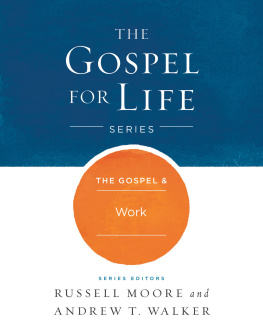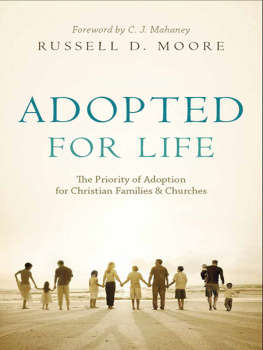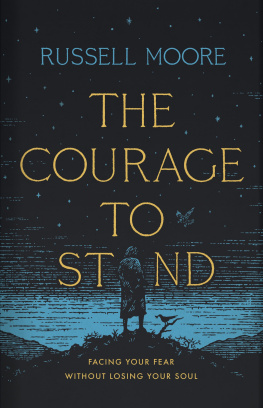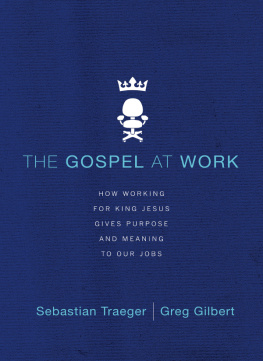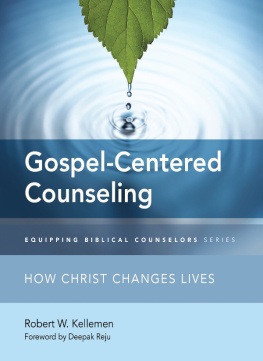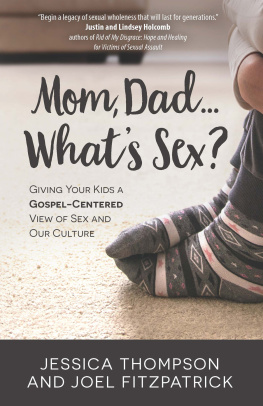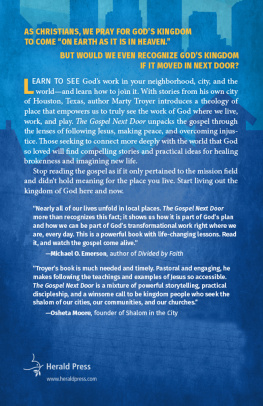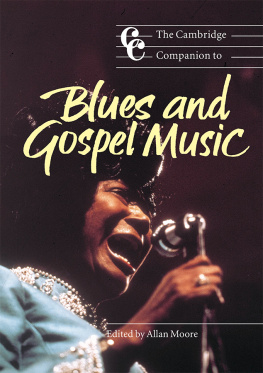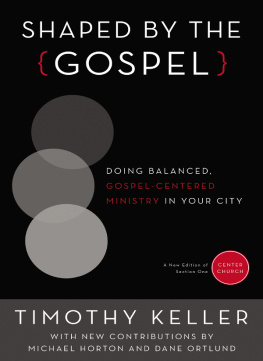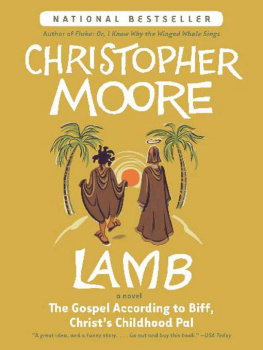Also in the Gospel for Life series
The Gospel & Racial Reconciliation
The Gospel & Same-Sex Marriage
The Gospel & Religious Liberty
The Gospel & Marriage
The Gospel & Abortion
The Gospel & Parenting
The Gospel & Pornography
Copyright 2017 by Ethics and Religious Liberty Commission
All rights reserved.
Printed in the United States of America
978-1-4336-9048-8
Published by B&H Publishing Group
Nashville, Tennessee
Dewey Decimal Classification: 174
Subject Heading: WORK \ BIBLE. N.T. GOSPELS \ WORK ETHIC
Unless otherwise noted, all Scripture quotations are taken from the Christian Standard Bible, copyright 2017 by Holman Bible Publishers. Used by permission. Christian Standard Bible and CSB are federally registered trademarks of Holman Bible Publishers.
Also used: the English Standard Version ( esv ), copyright 2001 by Crossway Bibles, a publishing ministry of Good News Publishers.
1 2 3 4 5 6 7 8 21 20 19 18 17
Series Preface
Russell Moore
Why Should the Gospel for Life Series Matter to Churches?
In Acts chapter 2, we read about the Day of Pentecost, the day when the resurrected Lord Jesus sent the Holy Spirit from heaven onto His church. The Day of Pentecost was a spectacular daythere were manifestations of fire, languages being spoken by people who didnt know them, and thousands of unbelievers coming to faith in this recently resurrected Messiah. Reading this passage, we go from account to account of heavenly shock and awe, and yet the passage ends in an unexpectedly simple way: And they devoted themselves to the apostles teaching and the fellowship, to the breaking of bread and the prayers (Acts 2:42 esv ).
I believe one thing the Holy Spirit wants us to understand from this is that these ordinary things are not less spectacular than what preceded themin fact, they may be more so. The disciplines of discipleship, fellowship, community, and prayer are the signs that tell us the kingdom of Christ is here. That means that for Christians, the most crucial moments in our walk with Jesus Christ dont happen in the thrill of spiritual highs. They happen in the common hum of everyday life in quiet, faithful obedience to Christ.
Thats what the Gospel for Life series is about: taking the truths of Scripture, the story of our redemption and adoption by a risen Lord Jesus, and applying them to the questions and situations that we all face in the ordinary course of life.
Our hope is that churches will not merely find these books interesting, but also helpful. The Gospel for Life series is meant to assist pastors and church leaders to answer urgent questions that people are asking, questions that the church isnt always immediately ready to answer. Whether in a counseling session or alongside a sermon series, these books are intended to come alongside church leaders in discipling members to see their lives with a Kingdom mentality.
Believers dont live the Christian life in isolation but rather as part of a gospel community, the church. Thats why we have structured the Gospel for Life series to be easily utilized in anything from a small group study context to a new member or new believer class. None of us can live worthy of the gospel by ourselves, and thankfully, none have to.
Why are we so preoccupied with the idea of living life by and through the gospel? The answer is actually quite simple: because the gospel changes everything. The gospel isnt a mere theological system or a political idea, though it shapes both our theology and our politics. The gospel is the Good News that there is a Kingdom far above and beyond the borders of this world, where death is dead and sin and sorrow cease. The gospel is about how God brings this Kingdom to us by reconciling us to Himself through Christ.
That means two things. First, it means the gospel fulfills the hopes that our idols have promised and betrayed. The Scripture says that all Gods promises are yes in Jesus (2 Cor. 1:20). As sinful human beings, we all tend to think what we really want is freedom from authority, inheritance without obedience like the prodigal son. But what Jesus offers is the authority we were designed to live under, an inheritance we by no means deserve to share, and the freedom that truly satisfies our souls.
Second, this means that the gospel isnt just the start of the Christian life but rather the vehicle that carries it along. The gospel is about the daily reality of living as an adopted child of a resurrected Father-King, whose Kingdom is here and is still coming. By looking at our jobs, our marriages, our families, our government, and the entire universe through a gospel lens, we live differently. We will work and marry and vote with a Kingdom mind-set, one that prioritizes the permanent things of Christ above the fleeting pleasures of sin and the vaporous things of this world.
The Gospel for Life series is about helping Christians and churches navigate life in the Kingdom while we wait for the return of its King and its ultimate consummation. The stakes are high. To get the gospel wrong when it comes to marriage can lead to a generations worth of confusion about what marriage even is. To get the gospel wrong on adoption can leave millions of unwanted children at the mercy of ruthless sex traffickers and callous abusers. Theres no safe space in the universe where getting the gospel wrong will be merely an academic blunder. Thats why these books existto help you and your church understand what the gospel is and what it means for life.
Theology doesnt just think; it walks, weeps, and bleeds. The Gospel for Life series is a resource intended to help Christians see their theology do just that. When you see all of life from the perspective of the Kingdom, everything changes. Its not just about miraculous moments or intense religious experiences. Our gospel is indeed miraculous, but as the disciples in Acts learned, its also a gospel of the ordinary.
Introduction
Andrew T. Walker
The rat race. My boss is horrible. Im overworked and underpaid.
These are common phrases heard every day. Theres no doubt that at some point, you have been irritated at your coworkers, your boss, or the daily routines that grow boring.
But did God design us to be miserable? To languish away in boredom?
No.
I recall being on vacation not long ago when a big Supreme Court announcement came down. I so badly wanted to drop what I was doing and pick up my computer so I could write and respondso I could do my job. I didnt, because I needed to legitimately unplug from work.
But that caused me to reflect back and ask the question: Why would I choose to work over staring at the ocean for eight hours? Because God created every single person to work, contribute, provide, and thrive. Its in our bones. Its why people who are on vacation, though relaxed, grow miserable if their talents and skills arent being tapped into. Its why someone who refuses to work isnt just being disobedient, but rejecting what it means to be human.
None of this should be a surprise to us.
The very beginning of the Bible is packed with God commissioning our ancestors, Adam and Eve, to take loving care and stewardship of creation. They were to work. They had responsibility tasks to tend to so that Gods creation was being properly provided for. Work had to be done even before sin entered into the picture. Why?
God intends people to reflect the creativity of their Creator. We werent made to be idle. Whether you have a blue-collar job or a white-collar job, the unique ways that God has gifted you and skilled you are meant to draw our wonder back to the Creator.

